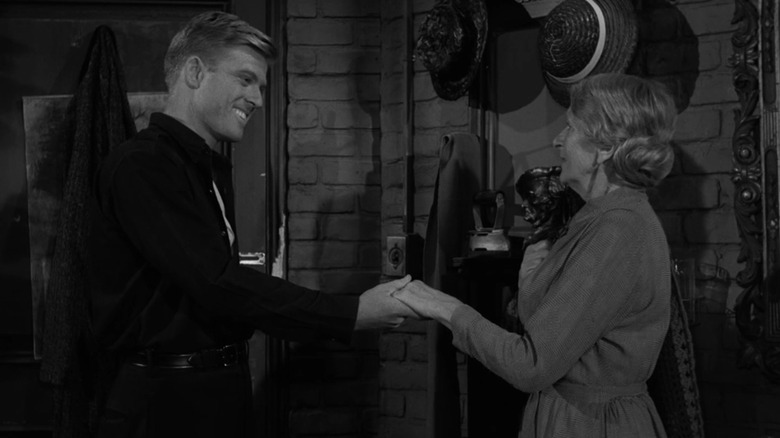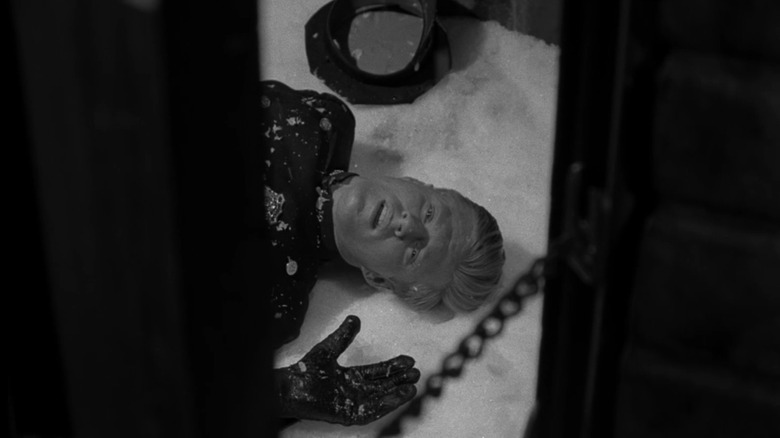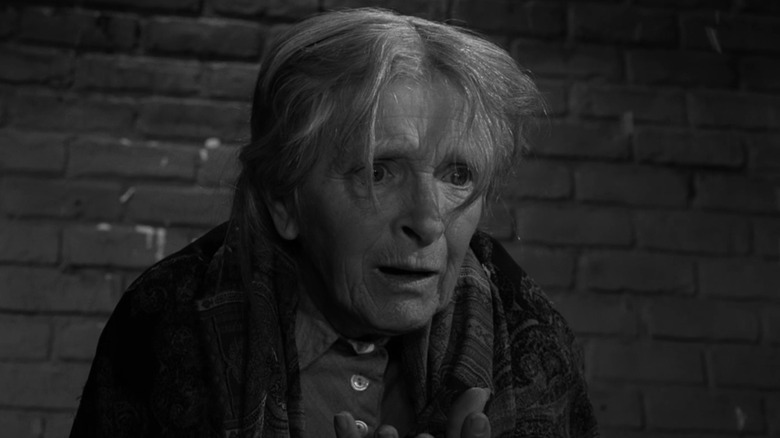A Young Robert Redford Almost Ruined An Otherwise Great Twilight Zone Episode
The former most popular episode of "The Twilight Zone" had a bumpy road to success. The season 3 outing "Nothing in the Dark" may have left a strong impression on viewers with its passionate take on mortality, but some of its casting choices left those involved worried it wouldn't work at first. Namely: a young Robert Redford, still in his earliest years on screen, apparently didn't make a strong positive impression with his performance.
"He was very new," episode director Lamont Johnson is quoted as saying in Marc Scott Zicree's book "The Twilight Zone Companion." Johnson, who also helmed such famous chapters as "The Shelter" and "Five Characters in Search of an Exit," didn't outright disparage Redford's performance as one of just three characters in the episode, but Zicree notes that he wasn't great in the chapter in which he interviews the filmmaker. While Johnson wasn't outright critical of the actor, he did admit that he was cast for his looks.
"I saw him on 'Playhouse 90' in a one-scene part with Charles Laughton, and I thought he was amazing. I mean, I thought he was amazing looking," Johnson said. "Playhouse 90," an anthology series that ran on CBS from 1956 to 1960, featured TV plays written by "The Twilight Zone" creator Rod Serling, including the show's final episode, "In the Presence of Mine Enemies." Redford played a Nazi soldier in the Warsaw-set play, but Johnson saw an all-American quality to him that was fitting for a "Twilight Zone" script about an ultimately benevolent incarnation of Death.
Redford was green and his co-star kept making up accents
"I thought if you had somebody who had those kind of blazing eyes and that candor and that kind of American Beauty about him, he'd be great for this cop as I was reading it," Johnson told Zicree. In "Nothing in the Dark," an elderly woman named Wanda (Gladys Cooper) hides in her home, terrified of meeting death head-on. When a cop named Harold (Redford) is shot outside her door, she sets her paranoia aside to help him. By the episode's end, another man (R.G Armstrong) has knocked, telling her that the building is due to be demolished. Wanda realizes Harold is the Death figure she'd feared for so long and ends up leaving the world arm in arm with him, unafraid to move on.
Ultra-green Redford's performance isn't great here (though a beautiful script from George Clayton Johnson helps him along), but he wasn't the only actor whom the powers-that-be had qualms about. Johnson says that others were doubtful that stage star Cooper could play such a humble old lady type, and it took a while to nail the accent for the character. "She was a great lady of the theater, and she had an elegant, polished London Mayfair kind of speech," Johnson says in "The Twilight Zone Companion," "but it seemed incongruous for that character, who's a sort of an Apple Mary character."
Somehow, it all worked
According to the director, "Everybody said, 'Oh, she's such a great elegant lady, how could she possibly...?' I said, 'She can do it.'" After that, the main obstacle was coming up with an appropriate speaking voice for the character. "She tried various accents for me," he said, noting that she ended up with "a nice kind of nasal, low London quality that was just a bit common and slightly whiney." Episode scribe Clayton Johnson was not initially a fan. "When I heard her first talking with the cockney accent, I didn't think it would work," he said. "I thought she should play it with her own voice, an old woman's voice."
Cooper insisted on sticking with the voice she'd chosen, and as Clayton Johnson put it, "She started to do this strange British accent–and I fell right into believing it." The Oscar-nominated actress gives a stellar performance in the episode, and together, she, Redford, and Armstrong forge something beautiful with the help of a stunning script and sharp camerawork. By the episode's end, "Nothing in the Dark" feels like a speedrun through all the upsetting emotions surrounding the idea of death that we usually try to ignore.
Instead of ending with a question mark or with Wanda's most suffocating fears realized, the episode morphs into something surprisingly comforting in its final moments. "Like all of us," Serling says in his closing narration, this old woman "was frightened of the dark." Yet when she finally met death, he says, she "discovered in a minute last fragment of her life that there was nothing in the dark that wasn't there when the lights were on." It's a sweet final message about never facing the unknown alone, one that hits you straight in the heart and makes you forget any weird accent work or stiff performance that came before.


